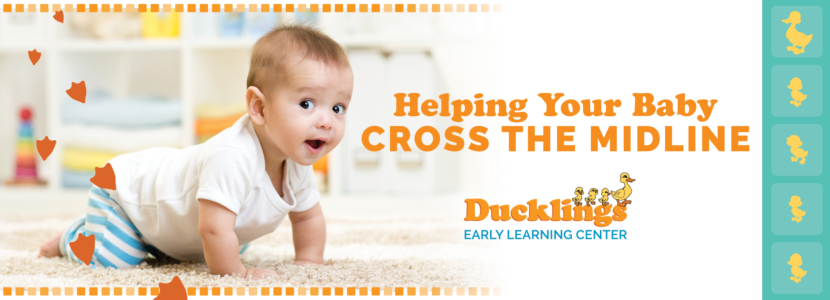
Helping Your Baby Cross the Midline
Physical movement is an important part of a healthy life, especially in childhood. Physical activity impacts our health in many ways, but did you know that one specific type of physical movement can impact a child’s cognitive and emotional development?
“Crossing the midline” requires both sides of the brain to communicate and work together. Picture an imaginary line running vertically down the center of your body. “Crossing the midline happens anytime we cross one part of our body to the opposite side. This could be reaching the right hand to tie the left shoe, crossing one leg over the other, or even reading a book when our eyes go from the left side of the page to the right,” Raina Cordell explains on her blog, HolFamily.
By age 3 or 4, children should be able to use both sides of their body effectively. When a child exhibits difficulty crossing the midline, this can affect numerous aspects of development. According to the Pediatric Therapy Center, “It can affect their ability to read. While the child is moving their eyes across the page, their eyes may stop in the middle and frequently lose their place. It also affects handwriting since a child must cross the midline in order to write from left to right; the child may need to stop in the middle of the page to switch hands. Many self-care and daily living skills require crossing the midline as well (such as putting on socks/shoes and brushing teeth). Lastly, the inability to cross midline impacts eating. Children may have trouble properly moving food around in order to chew and swallow.”
Because of the COVID-19 pandemic, it can be challenging for parents and caregivers to help kids strengthen these skills. Managing busy work schedules and personal routines from home can impact the rate of their physical development as children engage in less structured physical activities. This is where Ducklings can step in to help.
Using a curated curriculum developed by expert early childhood educators, Ducklings guides young children through each milestone so they remain on track. Our childcare centers provide daily social interaction and hands-on instruction and activities from trained educators. Parents can gain a peace of mind knowing Ducklings’ programs offer stability and routine for families during this difficult period.
At home, parents and caregivers can still foster this specific type of movement by engaging in activities like crafting and role playing games such as Simon Says. Everyday routines like encouraging little ones to dress themselves can help them practice these skills as well. For more ideas, Growing Hands On Kids provides a great resource with crossing the midline activity ideas for toddlers, preschoolers, and older children.
For babies and younger infants, refer to this informative resource from How We Learn to spark ideas.
